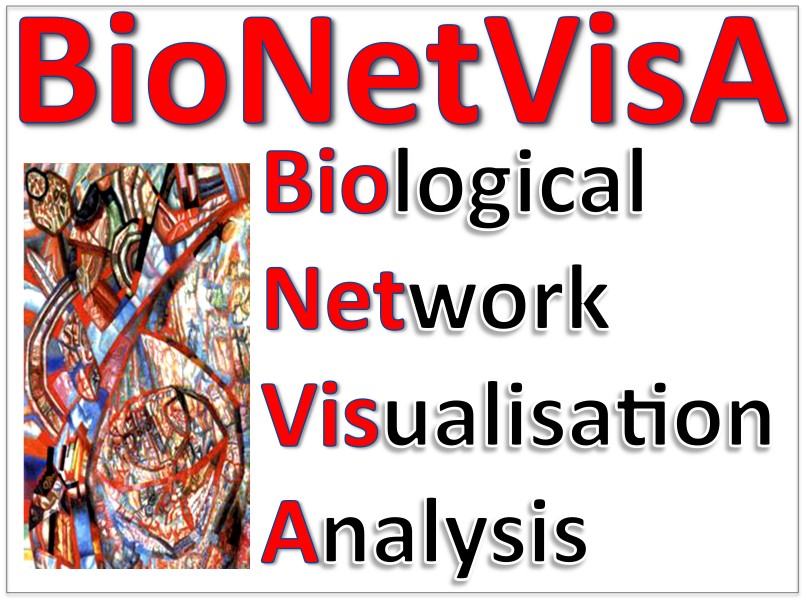
Biozentrum-the new building- University of Basel
Spitalstrasse 41
4056 Basel, Switzerland

BioNetVisA 2021 workshop
From biological network reconstruction to data visualization and analysis in molecular biology and medicine
The workshop presentations are available here
BioNetVisA workshop brings together different actors of network biology from database providers, networks creators, computational biologists, biotech companies involved in data analysis and modeling to experimental biologists, clinicians that use systems biology approaches. The participants are exposed to the different paradigms of network biology and the latest achievements in the field.
Motivation
The goal of BioNetVisA workshop is to build a discussion around various approaches for biological knowledge formalisation, data integration and analysis; compatibility between different methods and biological networks resources available the field; applicability for concrete research and clinical projects depending on scientific question and type of high-throughput data.
The BioNetVisA workshop aims at identifying bottlenecks and proposing short- and long-term objectives for the community as discussing questions about accessibility of available tools for wide range of user in every-day standalone application in biological and clinical labs. In addition, the possibilities for collective efforts by academic researchers, clinicians, biotech companies and future development directions in the field will be discussed during the round table panel.
BioNetVisA 2021 Program
| 8:30 - 9:00 Registration |
| Session 1 |
| 9:00 - 9:30 Looking Closely at Molecular Interactions Henning Hermjakob EMBL-EBI, Cambridge, UK Abstract |
| 9:30 - 10:00 Fine tuning a logical model of cancer cells to predict drug synergies: combining manual curation and automated parameterization Åsmund Flobak NTNU, Trondheim, NO Abstract |
| 10:00 - 10:15 A novel approach to maximize network lifetime using novenary model in WSN Sushree Pradhan Sambalpur University Insitute of Information Technology, IN Abstract |
10:15 - 10:45: Coffee break
| Session 2 |
| 10:45 - 11:00 Enhancing the usefulness of transcriptome data in the context of Leishmania-infected macrophages with pathways biocuration and mathematical modelling Julieth Murillo Silva Pontifica Universidad Javeriana-Cali, CO Abstract |
| 11:00 - 11:30 Evaluating the Reproducibility of Single-Cell Gene Regulatory Network Inference Algorithms Laura Cantini IBENS – ENS, Paris, FR Abstract |
| 11:30 - 12:00 Regularization for sparsity, biological priors and neural networks in cancer survival models Valentina Boeva ETH, Zurich, CH Abstract |
| 12:00 - 12:15 Kinase interaction network expands functional and disease roles of human kinases Marija Buljan Empa, Materials Science and Technology, Zurich, CH Abstract |
12:15 - 13:30: Lunch
| Session 3 |
| 13:30 - 14:00 Personalized anti-cancer drug treatment choice using RNA-seq and network analysis Alexander Kel neXplain, Wolfenbüttel, DE Abstract |
| 14:00 - 14:30 Quantitative systems pharmacology model-based drug target discovery for influenza Thomas Helikar University of Nebraska, Nebraska, US Abstract |
| 14:30 - 15:00 Molecular interaction networks controlling neural stem cells Rupert W Overall Humboldt University of Berlin, DE Abstract |
| 15:00 - 15:15 Prediction of intratumor transcriptional heterogeneity from bulk tumors Agnieszka Kraft ETH, Zurich, CH Abstract |
| 15:15 - 15:30 An explainable deep learning approach to kidney cortex cell classification Thomas Chen Academy for Mathematics, Science, and Engineering, Rockaway, US Abstract |
| 15:30 - 16:00 Graphia: A platform for the graph-based visualisation and analysis of high dimensional data Tom Freeman The University of Edinburgh, Edinburhg, UK Abstract |
17:00: Start [BC]2 (Welcome words and lecture)
16:30 - 22:00 [BC]2 Welcome drinks and "party"
Important dates
| August 16 | Abstracts submission deadline |
| August 20 | Selected speaker's notification |
| September 5 | Registration deadline |
| September 13 | BioNetVisA 2021 workshop |
Topics
Graphical representation of biological knowledge
Molecular interaction and pathway databases
Comprehensive signalling networks
Networks annotation and curation
High-throughput data visualization, analysis and interpretation in the context of networks
Multi-scale networks (genome, epigenome, transcriptome, proteome, metabolome, lipidome..)
Contextualization of networks (species, diseases, developmental stages…)
Networks of inter-cellular communication
Network modelling
Machine learning/Artificial Intelligence approaches in network biology
Basic research and clinical application of networks
Microbiome and networks
Single-cell data and network inference
Networks for drug repositioning and disease coomorbidity
Abstract submission
We invite to submit your abstract for a talk or a poster in the topics described above.
The submission deadline is on August 1st 2021
Submitted abstracts will be reviewed by the scientific program committee and a notification of acceptance for a talk or a poster will be provided to the corresponding author by August 5th, 2021
Abstract format:
Title
List of authors (the first author is the presenting autor)
Affiliations
Abstract text in unstructured format (maximum 300 words)
Submission process
The link below will take you to the EasyChair submission page. Once logged, click on the 'Submission' tab to start the submission process. Enter authors, title without HTML elements, abstract up to 300 words, keywords, and indicate three-five relevant topics.
To assist us with creating the abstract booklet, please upload the same abstract as a word document in the section called "Upload Paper" using this
TEMPLATE
When the form is adequately filled out, press the 'Submit' button. You will receive an email from the conference "EasyChair". This email is solely a notification that EasyChair for BioNetVisA2019 has received the abstract.
Submit your abstract here
Registration and accomodation
Please note that all registrations to the workshop and accommodation arrangements have to be done through the [BC]2 registration webpage
Venue
Biozentrum-the new building- University of Basel
Spitalstrasse 41
4056 Basel, Switzerland
Organising committee
Emmanuel Barillot (Institut Curie, France)
Hioraki Kitano (Laboratory for Disease Systems Modeling, RIKEN Center for Integrative Medical Sciences, Japan)
Inna Kuperstein (Institut Curie, France)
Cristobal Monraz Gomez (Institut Curie, France)
Andrei Zinovyev (Institut Curie, France)
Samik Ghosh (Systems Biology Institute, Tokyo, Japan)
Robin Haw (Ontario Institute for Cancer Research, Canada)
Alfonso Valencia (Barcelona Supercomputing Center, Barcelona, Spain)
Contact us
bionetvisa@curie.fr